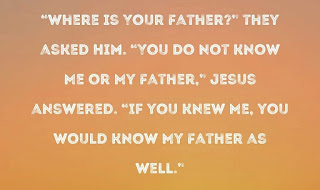Am I the last one to get this, or the first? The last, I hope.
Many times, many ways Jesus posed this.
Was it a trick question? Was it mean-spirited? Was he pointing out that no one else could know his father?
He was trying to use his own life as an example to point us to something that we could know about our own.
If a great man, a great soul, had three offspring, it could be the situation where honestly, someone observing this and knowing the family intimately could say, if you know child x, and you've never met the father, you know the father.
And we can imagine that the person is not talking about the eye color, or the face, or the hair, but the spirit.
And it could well be that one or both of the other siblings, the other offspring, had none of that Spirit or an opposite spirit. It happens. If you reflect you can bring to mind such situations that you have observed and experienced in your own life.
We're told plausibly that Jesus never knew his biological father and that he knew he did not know his biological father. This has been pointed out by various scholars. That this stimulated the imagination of the young Jesus in an understandable way, attempting to imagine that father that he had never known physically. Be that as it may.
Jesus, emotionally brilliant and intellectually, recognized that he had many spirits within him. His humanity, an integral feature of his soul, his mammalian brain, his limbic system, his humanity, a feature of that, he identified as his father. And he chose, for the joy and peace of it that can only be achieved in this way, he chose that that would be his father that he would serve every breath.




Comments
Post a Comment